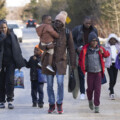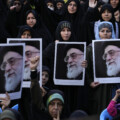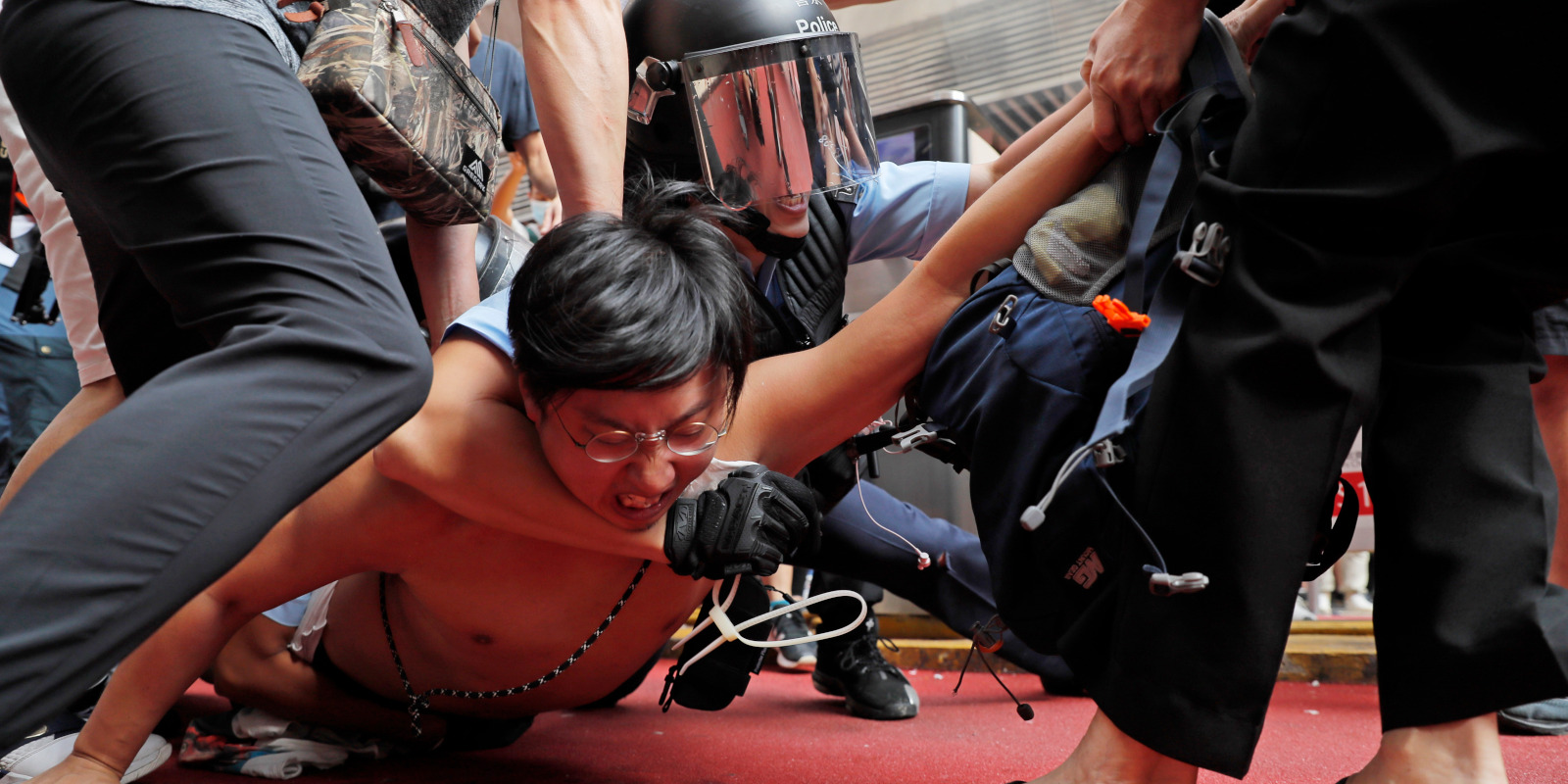This episode of Hub Dialogues features host Sean Speer in conversation with former executive of the Asia Business Council Mark L. Clifford where they discuss his new book about China’s crackdown on Hong Kong, China’s broader ambitions, and why he doubts he will ever return to the city he used to live and work.
You can listen to this episode of Hub Dialogues on Acast, Amazon, Apple, Google, Spotify, or YouTube. A transcript of the episode is available below.
Transcripts of our podcast episodes are not fully edited for grammar or spelling.
SEAN SPEER: Welcome to Hub Dialogues. I’m your host Sean Speer, editor-at-large at The Hub. I’m honoured to be joined today by Mark L. Clifford, who’s the President of the Committee for Freedom in Hong Kong, a former executive director of the Asia Business Council, and editor-in-chief of both English language papers in Hong Kong, The Standard and the South China Morning Post. He’s also the author of the new book Today Hong Kong, Tomorrow The World: What China’s Crackdown Reveals About Its Plans To End Freedom Everywhere. I’m grateful to be able to speak to Mark about the book’s insights and ideas. Thanks for joining me, and congratulations on the book’s release.
MARK L. CLIFFORD: Thanks so much, Sean. It’s great to be here.
SEAN SPEER: Maybe we’ll just start with a question of personal biography. Mark, your biography notes that well you were a resident of Hong Kong for more than 20 years, you’ve recently left the country. What prompted you to leave?
MARK L. CLIFFORD: I took a kind of long end of the year holiday at the end of 2020, and I just bought my ticket to return. I’d plan to come back just after the new year, a year ago, and happen to see that Jimmy Lai, who is the chairman of Next Digital, used to publish the pro-democracy newspaper, Apple Daily, and a company that I was on the board of, I saw a picture of Jimmy in manacled chains in a courtroom.
Thirty-five pounds of chains to restrain, as if any were needed, a 74-year-old, diabetic, practicing Catholic who’s always preached nonviolence. Jimmy was thrown in jail before he was convicted on the flimsiest of charges, and to add to my personal concern—I mean, I was very concerned for this man, one of the greatest people I’ve met in my life, but the prosecutor, among many other reasons, said that bail should be denied because of some very innocent remarks I’d made publicly calling Jimmy a symbol of Hong Kong resistance.
Now, why anybody should be thrown in jail because somebody says they’re a symbol of Hong Kong resistance, why anybody should be thrown in jail because he’s just been doing what he’s been doing for decades, and that’s fighting for democracy in Hong Kong, I don’t know. But it didn’t seem like the kind of place that I’d want to go back to in a hurry. And as a director, I had found myself a few months earlier being the only director in Hong Kong not in police custody after National Security Law.
Police raided the headquarters of Apple Daily and took away a number of directors, including Jimmy Lai, the CEO, the COO—I mean, it was, you know, it was getting increasingly uncomfortable for me personally, but it was just very tragic and sad to see my colleagues being put behind bars for doing what they’ve been doing for 26 years, which is running a newspaper and exercising the freedom of press that the Chinese had promised they’d continue to enjoy.
SEAN SPEER: A fascinating insight, Mark, which really speaks to one of the strengths of your book. You both have a journalistic eye describing the developments in Hong Kong, but as you you outlined in the answer, you’re also a participant; you’re not only an observer. And I think that combination makes this book such a fascinating read.
If I can go back for a second though for some of our listeners who may not be familiar with Hong Kong’s unique institutional arrangement with China. If we can start with some basic context. What does it mean that Hong Kong was established by international treaty as a special administrative region? And how has that arrangement enabled this city to flourish for the past 25 years or so, even though it was part of the Chinese orbit?
MARK L. CLIFFORD: Yeah, Hong Kong, of course, was a British colony for 150 years and the time for that came to an end. The 99-year lease on part of the territory ran out and the British agreed to hand the territory back to China, and they signed an international treaty registered at the United Nations that governed you know, what would happen to Hong Kong after that. And the Chinese very magnanimously agreed to a 50-year period, where Hong Kong would essentially function as a kind of almost like a semi-independent state.
It has its own currency, its own tax system, there’s a very hard border—it’s actually harder to go from Hong Kong to China than it is from Canada to the U.S. There really is one country, two systems. And China also promised under a kind of mini-Constitution that, during these 50 years, Hong Kong people continue to enjoy all the freedoms they had under the Brits: freedom of press, freedom of assembly, freedom of worship, freedom to pretty much just live your life without fearing there’d be a midnight knock at the door. Unfortunately, that changed.
SEAN SPEER: May I ask just one more basic question before we move on to the bigger story? You mentioned the international treaty. Does it anticipate the possibility of breach? And if so, does it outline any remedies if the parties, namely China, act contrary to its provisions?
MARK L. CLIFFORD: Unfortunately, no. Britain does have periodic reviews twice a year to look at whether or not China is fulfilling its obligations under the treaty. Not only does China ignore those, China has now decided that the treaty is a historical document that has no more meaning or effect now that China’s gotten Hong Kong back. So, I think it’s a really great indication of the degree to which we really can’t trust China. We can’t take China at its word.
SEAN SPEER: You mentioned, Mark, that at least initially, China was living by the treaty. When did you start to see a change in Chinese policy vis-à-vis Hong Kong? And what do you think caused China to break with its treaty commitments?
MARK L. CLIFFORD: I don’t know that China ever really was comfortable. It promised all these things, including a move towards universal suffrage, and that had never existed under the Brits. There had been a movement towards more direct democracy of the city council, effectively. But China promised there’d be a move towards universal suffrage and to allow Hong Kong people to elect what’s effectively the mayor and the entire city council, under what would be the kind of universal suffrage you have in Canada. I don’t think China ever really liked that idea, and after about 15 years, the Hong Kong people started getting increasingly impatient with the reality that China was not going to live up to its promises.
And so, we had a remarkable student-led movement in 2014, called the Umbrella Movement or Occupy Central. And I think at that point, China started saying, “Whoa, we have really lost control,” because they thought that the Hong Kong people would welcome you know, Chinese rule with open arms, and instead what they found out is a generation of people who were born after the end of British colonialism were in fact leading this student movement. People like Joshua Wong and other people who were babies when the British left. I think that just shocked the Chinese, coupled with the fact that Xi Jinping has just taken power, and of course, he’s the hardest line and most powerful ruler we’ve had at least since Mao Zedong.
SEAN SPEER: You mentioned in an earlier answer the increasing crackdowns and suspension of any form of habeas corpus rights and so on. Do you want to just elaborate, please, how has China’s undermining of Hong Kong’s independence manifested itself? What are its methods? And what have been the consequences for the country’s politics and culture?
MARK L. CLIFFORD: Well, of course, Hong Kong is not a country, and I think that’s the real issue because Hong Kong people see themselves as a kind of semi-independent place. And again, I think that drives Beijing nuts because the communist leaders in Beijing have one vision of China, and that’s one where they control everything: they control people’s bodies; they control people’s thoughts. In Hong Kong, people are not like that, and there was a very draconian law that came in about a year-and-a-half ago, the National Security Law, and that effectively criminalizes thought. And so, since then, we’ve seen, beginning with Apple Daily, all major opposition or pro-democracy newspapers shut down, opposition politicians thrown in jail or having to flee.
Civil society, unions, teachers unions, associations have been forced to disband; bank accounts seized, property—which is so ironic in a hyper-capitalist city like Hong Kong. So, just one of many, many examples. There was a group of speech therapists and three of them co-authored a book, and it was a children’s book, and it features sheep and wolves. And the leader of that group is now in jail without bail without any imminent trial date on national security law charges because supposedly she in this book has incited hatred, and therefore it’s subversive under the kind of thought crime way of thinking of this national security law. We’ve gone from a city that was as free as Toronto or New York to one that’s yeah, more like, I don’t know, the old days of the Soviet Union. I mean, it’s a really scary situation right now.
SEAN SPEER: May I ask you to project forward, Mark? What in your view is the likely outcome of China’s ongoing interference in Hong Kong? Is the city’s experience as what you’ve called quote, “beacon of prosperity and freedom,” essentially over? Is there any reason for optimism?
MARK L. CLIFFORD: I think in the short to medium term, it’s extremely hard to be optimistic. The Chinese military the People’s Liberation Army has a garrison in Hong Kong. It’s always been very well behaved; it stays out of sight. But the new head of that has just been named. He’s come from Xinjiang, which is the of course the mostly Muslim Uyghur region in the western part of China, where we have the largest internment of civilians since the Nazi period. This guy ran an elite commando unit that hunted down supposed terrorists in Xinjiang. The fact that he’s being sent to Hong Kong to run the PLA gives you a pretty good indication of what the Chinese see coming, and it’s not easy.
Another top Chinese official who was appointed a couple of years ago was best known for busting up Christian churches in the province of Xinjiang. I mean, these are tough, hard communist people who are close to Xi Jinping, and want to enforce his draconian rule. I think Hong Kong is regarded a bit like Tibet and Xinjiang, it’s a kind of far-off restive province, and needs to be hammered into submission. I happen to think and believe in the long run that the people of Hong Kong and their spirit and their love of freedom is going to prevail. But you know, the long run can be a very long time.
SEAN SPEER: In that regard, what do you think about the West’s reaction to China’s crackdowns in Hong Kong? Are you surprised? Are you disappointed? What should these countries be doing in your view?
MARK L. CLIFFORD: Well, the good news is that I think the West, say Canada with the two Michaels, they have the case of Michael Spavor and Michael Kovrig, and I think caused the scales to fall from a lot of people’s eyes. The behaviour of China in Xinjiang and in Hong Kong, again, has hardened attitudes in a lot of democratic countries. I think we’re still in the early stages of a fundamental reassessment of our relationship with China. Look, it’s the world’s second-largest economy, it’s the most populous country. We don’t think anybody wants to write off China or be excluded from the community of nations. But I do think to go along with this behaviour is crazy and very, very short-sighted.
So, we’ve seen some sanctions against—let’s just take the case in Hong Kong, we’ve seen some sanctions against senior Hong Kong officials, but I think we’re gonna have to see a much harder, more punitive sanctions regime against judges and other enablers who are using administrative procedures to lock people up, steal their assets, take away their liberty. And I think that the days when sort of mid-ranking Hong Kong officials or judges could travel with impunity to the West, have bank accounts in London, send their children to school in Vancouver, I think we’ve got a look at ending those sorts of days. Nobody wants war with China, but it seems like China is gearing for real confrontation with the West. So, I think the hardening has begun, but we need to go much further. We need to be much more realistic about China’s ambitions.
SEAN SPEER: Let me just pick up those points. Your book argues that Hong Kong is a window into how China will act in other regions and countries within its orbit. Do you mind elaborating on this key insight? What does this experience tell us about a world in which China is an increasing superpower?
MARK L. CLIFFORD: Well, it’s a great question and it’s one where the answer is just unfolding. But it would mean, for example, Sean, that you wouldn’t be able to have a radio program like this because there would be united front people in Canada who would be harassing you and picketing outside your station bullying you. It really means that nobody can talk about subjects that China doesn’t want talked about, and that’s, of course, an ever-increasing list.
Look at the kind of bullying that Lithuania, a tiny little Baltic country is undergoing because it invited Taiwan to open a trade office under the name of Taiwan. Or a larger country like Australia that called for an independent investigation into the origins of COVID. By the way, that’s something China says it wants, but China decided that a really truly independent investigation would be too scary for China. And so, it essentially shut off imports of most Australian goods except the things that it needed like iron. It’s a world in which the ability to freely discuss and act is circumscribed.
It’s a world that the Dalai Lama can’t be invited to an American university; a world where U.S. professors don’t have numerous Chinese students in their classes, because there’s too much of a danger that one Chinese student is spying on the other Chinese student. And by the way, all these things are already happening.
SEAN SPEER: Let’s wrap up on Canada. There are, according to some estimates, 300,000 Canadian citizens living in Hong Kong. How should Canadian policymakers think about the place of Hong Kong and the country’s foreign policy? And how should they think about China more generally?
MARK L. CLIFFORD: It’s an excellent question, but I think that we need to—first of all, it is remarkable these 300,000 Canadian passport holders—I think a lot of people are making some hard decisions about whether to leave or whether to stay and there’s already been a significant decrease in population as people leave Hong Kong. I mean, that’s really sad for me to think of Hong Kong hollowing out like that. It’ll probably be great for Canada and for the countries where these Hong Kongers go, but I think more on a more strategic level, countries like Canada and other countries need to ensure that they’re not beholden to China.
So clearly, a lot of goods are manufactured in China, and I think they will be for some time. It’s one thing to have non-strategic goods manufactured there, but I think we need to look very hard at being too dependent on China for critical goods. I think the COVID pandemic was a kind of wake-up call, exposing how much more dependent we are on some really far-flung supply chains. So, imagine if China for strategic reasons decided to want to start squeezing the West. I think we need to be thinking about these issues. And in that regard, and more immediately, I think we need to be looking at financial flows.
To me, it’s outrageous that a firefighter or a health care worker from Toronto could see her pension fund money fueling Chinese military expansion, but that’s effectively what’s happening right now, and a lot of that money is being funneled through Hong Kong. It’s as a result of often index providers who say, “Oh, you need to have X percent of your money in China and then just arithmetically the investments go up”. But why do we want to be financing somebody who says that they want to confront us and effectively destroy our way of life? I mean, I think these are big, long-term strategic issues that Canadian policymakers, politicians, and of course, the public need to be thinking about and start grappling with.
SEAN SPEER: That’s a great answer, Mark. If I may just end with a personal question. We started talking about your difficult decision to leave Hong Kong. Do you think you’ll go back? Do you have intentions to ultimately live there once again?
MARK L. CLIFFORD: I’d love to go back. I think that the prospects of that are diminishing. I celebrated coincidentally, my 64th birthday last summer by taking over as president of this new NGO, the Committee for Freedom in Hong Kong, to try to free political prisoners in Hong Kong. I didn’t think at the age of 64 I’d be starting a new career as a political human rights activist, having you know, as we discussed, spent a lot of my life on the sidelines just watching these things. But I’m drawn into something where I’m trying to free my colleagues and, you know, hundreds of people I don’t know. And I think the prospects that the Hong Kong government would welcome me back despite the fact that I have a permanent residence there are pretty slim.
So, I’d love to go back. It’s one of the most magical, wonderful cities in the world in many ways, and it breaks my heart, not personally, but for the millions of Hong Kongers who had their lives shattered by these thugs from Beijing who really seem to just care about staying in power. It’s unfortunate that that way of thinking has now breached the border and has infected Hong Kong.
SEAN SPEER: Well, if listeners want to better understand the circumstances that forced you to leave your home, they should read Today Hong Kong, Tomorrow The World: What China’s Crackdown Reveals About Its Plans To End Freedom Everywhere. Mark L. Clifford, thank you so much for joining us today at Hub Dialogues.
MARK L. CLIFFORD: Thanks so much, Sean. It’s been a real pleasure and really appreciate your interest.
Recommended for You

Patrick Luciani: From the courts of the Popes to Putin’s plans to challenge the West—Here are the top five books I reviewed last year

Migrants will flood Canada’s southern border and a tactical nuke will be used in war: The Hub’s can’t-miss predictions for 2025

The end of Iran’s clerical rule and wine is a tragic casualty in Trump’s tariff war: The Hub’s can’t-miss predictions for 2025

Need to Know: Buckle up, we’re in for a wild ride in 2025



